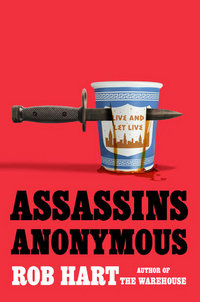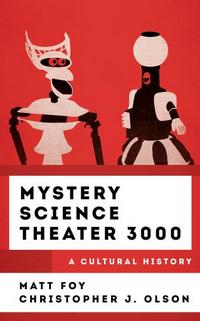 Mystery Science Theater 3000:
Mystery Science Theater 3000:
A Cultural History
by Matt Foy and Christopher J. Olson
DETAILS: Series: The Cultural History of Television Publisher: Rowman & Littlefield Publishers Publication Date: August 20, 2024 Format: eARC Length: 182 pgs. Read Date: August 6-8, 2024

What’s Mystery Science Theater 3000: A Cultural History About?
This is a retrospective of the show—its history, development (highs and lows), spin-offs, and latest formats. It’s also an examination and consideration of the impact the show has made to its viewers and on the industry of entertainment, and the ripple effects it has had on pop culture.
It looks at how MST3K was shaped by the upbringing of its cast and writers—focusing on the tone and style of the hosts—as well as the network (or lack thereof) that brought the show to the audience.
It wraps up with an Appendix listing twenty episodes that best capture the show for new viewers—between the riffs, the movies themselves, and hosting segments—with each host being represented. They truly picked some gems—good for new viewers and established fans to go back and revisit some highlights.
The Worst We Can Find
“Hey, wait a second, H.C.,” I can hear some of you thinking, “you talked about this book last July.” Well, no. But I can understand the confusion. That was actually the book, The Worst We Can Find: MST3K, RiffTrax, and the History of Heckling at the Movies by Dale Sherman.
I haven’t done this a lot, but every now and then I read a book that is someone taking all/part of their doctoral dissertation and reworking it/part of it for a wider/popular audience. In many ways, that’s what this felt like—Foy and Olson’s work was the technical/academic book for those of a more scholarly persuasion, and Sherman’s was the version for the wider audience. Except that Sherman’s was longer, and it usually goes the other way.
This is not a criticism of either book—at all. They both over their respective emphases and quirks. They’re both dependent on interviews and articles produced by others; both are written by fans who’ve dedicated a good deal of time to both the research and production of the book—propelled by a greater deal of time developing an appreciation of MST3K; and both are the kind of things that die-hard fans will sink their teeth into. One’s just a bit more highbrow than the other.
Dissecting Some Frogs
Analysts have had their go at humor, and I have read some of this interpretative literature, but without being greatly instructed. Humor can be dissected, as a frog can, but the thing dies in the process and the innards are discouraging to any but the purely scientific mind.
The idea has been variously ascribed, but it seems that E. B. White and Katharine S. White first put it into print. Whoever said it first, the idea floated through the back of my mind at more than one point while reading this book.
There were repeated explanations of various jokes throughout the book—and not one of them was necessary (if you ask me, anyway). Maybe one or two of them will help younger readers who are not familiar with the pop culture of the 90s or earlier, but I think context alone will take care of the questions a reader will have. And you understand the authors’ impulse to explain them and maybe even admire their attempt while rolling your eyes at the outcome.
Flirting With Semantic Satiation
The term Intertexuality appears so often in this book, that you can imagine Tom Servo and Crow riffing on it. But it’s not like there are a lot of synonyms available, and it’s a real focus of the authors and a strong point of the book. Still, the SOL crews would hammer them on it.
The consideration of how MST3K has trained a couple of generations in approaching intertextuality, media consumption, and responses to them is the intellectual core of this book. The show, in all its various incarnations, has shaped both the viewers and other shows, internet content, and general internet discussion in ways that are larger than the show’s ratings may suggest. The cultural footprint is oversized given viewership (the tapes did keep circulating, at least metaphorically).
I, for one, had given this very little thought until Fry and Olson pointed it out—along with their discussion of MST3K and its spin-off projects being at the forefront of newer delivery systems for media and programming. Given their humble beginnings, it’s really quite remarkable.
So, what did I think about Mystery Science Theater 3000: A Cultural History?
I’ve read two other books in this series (and keep meaning to read others), Friends and Gilmore Girls, comparing this to those, I’d say it captures the strengths of both and avoids what I recall as the shortcomings of the Friends volume and the spirit of the Gilmore Girls book. If nothing else, the diversity in these three installments demonstrates a strength of the series. You’re not going to get cookie-cutter approaches to the various series in consideration. Each author/team of authors is going to approach the show in question differently, reflecting the preferences and focus of the authors.
The only shortcoming I can think of (outside the attempted academic explanations of humor) is the lack of space given to Emily’s hosting/riffing style compared to the other hosts. I’m certain that this is a function of how few episodes she has appeared in, but it would’ve been nice to get a little more about her.
I was entertained by the book—both due to the authors’ style and the memories it conjured. I thought about the show and its legacy in ways I hadn’t before. I kicked myself for not taking part in the crowdfunding efforts I didn’t participate in. I was inspired to watch a couple of episodes I’d somehow missed—and just to make time for the show in general. Mostly this was an exercise in getting to know more about old friends, and seeing them in a different light.
I’m a sucker for anything MST3K related, so you know this worked for me. Do I know if you’ll appreciate this book if you’re not a fan or a media studies student? I doubt it’s for you. But if you’re either of those things—you’ll get something out of it.
What do you think, sirs?
Disclaimer: I received a copy of this book from Rowman & Littlefield via NetGalley—thanks to both for this.

This post contains an affiliate link. If you purchase from it, I will get a small commission at no additional cost to you. As always, the opinions expressed are my own.
![]()



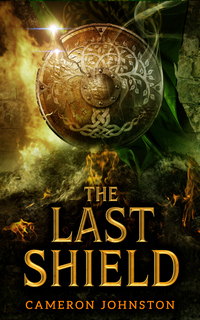
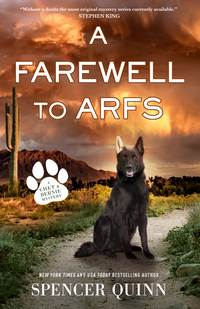
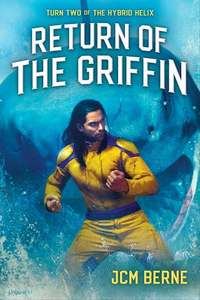
 A teleporter named “Bamf”? You know Berne chuckled/giggled to himself when he typed that.
A teleporter named “Bamf”? You know Berne chuckled/giggled to himself when he typed that.